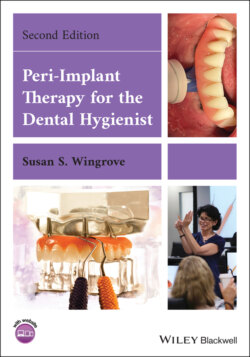Читать книгу Peri-Implant Therapy for the Dental Hygienist - Susan S. Wingrove - Страница 27
Box 2.1 Four major diseases linked with periodontal disease/risk factors for peri‐implant disease.
ОглавлениеCardiovascular/Cerebrovascular (CV/CV) disease: A link between periodontal/peri‐implant disease and cardiovascular disease/stroke has been established. Changes caused by infection and/or inflammation responses affect the build‐up of plaque on the inner lining of the blood vessels supplying the heart (coronary arteries) or brain (carotid arteries) and atherosclerosis can occur (4, 5).
Preterm birth/low birth weight: Studies have proven a link between periodontal/peri‐implant disease/infection and the risk of adverse pregnancy outcomes, including preterm birth and low‐weight babies (6, 7). This is caused by the action of blood‐borne oral bacteria or an increase in the blood levels on the inflammatory mediators that can cause early delivery.
Diabetes: Periodontitis/periimplantitis is a proven complication and all patients with diabetes should be evaluated for periodontal disease and monitored for signs of infections in the periodontium of implants. Good news, controlled diabetics show the same dental implant survival rate as patients without diabetes and it is now considered a predictable dental rehabilitation procedure for diabetics. (8)
Respiratory disease: Lung diseases, especially hospital‐acquired pneumonia, are linked to poor dental health. Pulmonary pathogens in plaque are aspirated into the lungs increasing the risk of pneumonia and chronic obstructive pulmonary disease (COPD). This includes implant patients with implant supported removable overdentures, often the implants are overlooked in institutional care facilities without the necessary information on care of dental implants. Treatment for good oral health care can reduce the patient’s risk of fever and fatal aspiration pneumonia (9–12).
